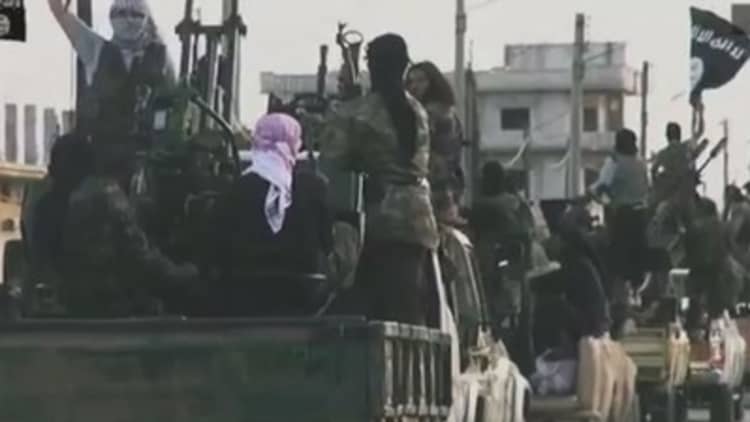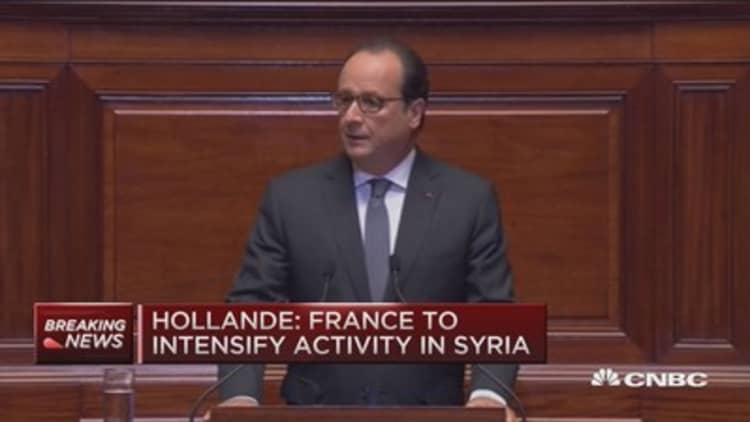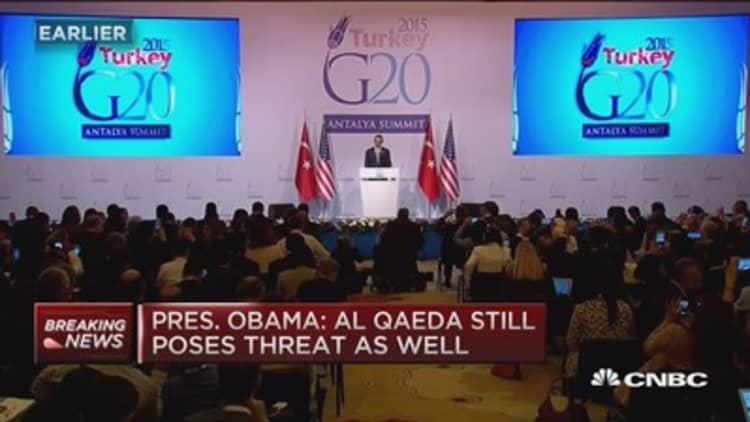



France is at war after the brutal attacks on Paris last week, President François Hollande said Monday, leading many to wonder if that war will include a full response from NATO, the military alliance sworn to protect it.
But the short answer is that military help from the North Atlantic Treaty Organization is unlikely to come.
The issue at hand is whether France would invoke Article 5 of NATO's founding treaty, which says an armed attack against a member state "shall be considered an attack against them all." Such an invocation would call on the United States, Germany, the United Kingdom and others to assist in the effort to "restore and maintain the security of the North Atlantic area."
Only one country has ever invoked Article 5: The United States activated that part of the treaty after the Sept. 11, 2001, attacks. France is among the NATO nations that contributed ground forces to the subsequent war in Afghanistan.
James Stavridis, a retired four-star U.S. Navy admiral and NATO supreme allied commander, wrote over the weekend in Foreign Policy that it's "NATO's turn to attack."
"There is a time for soft power and playing the long game in the Middle East, but there is also a time for the ruthless application of hard power," Stavridis wrote. "It is NATO's responsibility to recognize our current moment qualifies as the latter."
If you do not have local populations that are committed to inclusive governance and who are pushing back against ideological extremes, then they resurface.President Barack Obama
But experts said that France is unlikely to officially call on NATO, because the United States may oppose such a move. A NATO presence in the region also could do more harm than good in building an international coalition.
In a Monday speech, U.S. President Barack Obama cautioned that it would be a "mistake" to have full-scale ground force operations against the so-called Islamic State (also known as ISIS or ISIL), instead advocating for a measured approach that seeks to prevent repeating errors made in other recent U.S. wars.
"Not because our military could not march into ... Raqqa [ISIS' self-declared capital in Syria] and temporarily clear out ISIL, but because we would see a repetition of what we've seen before," Obama said after a G-20 meeting in Turkey. "If you do not have local populations that are committed to inclusive governance and who are pushing back against ideological extremes, then they resurface."
Additionally, the United States is particularly sensitive to official declarations of war, Anthony Cordesman, the Arleigh A. Burke Chair in Strategy at the Center for Strategic and International Studies, wrote in a Monday analysis. Internationally formalized war "raises serious issues about the rights of combatants, how you legally define ISIS as an opponent and other problems in international law," he wrote, adding that "a formal declaration of war against a claimed state with international networks is a potential legal nightmare."
France is unlikely to invoke Article 5 without first consulting the United States, according to Colin Clarke, a political scientist with Rand Corp.
"The last thing they would want is to invoke Article 5 and have the U.S. back away," he said, explaining that Washington may be reticent to initiate a treaty-legalized war as it pursues diplomatic agreement with Russia and others.
Russia itself remains a sticking point, as Moscow routinely voices anti-NATO rhetoric and accuses the alliance of encroaching on its interests. Russia already has military aircraft and support troops in Syria and is flying missions against ISIS.
"To have this Cold War-era institution acting in the same theater as the Russians seems highly unlikely," Clark said. "Although, stranger things have happened."
France appears to be considering its options, and has not given any clear indication whether it will call on NATO, Stratfor military analyst Omar Lamrani told CNBC. In a Monday note, political analyst and former U.K. diplomat Alastair Newton wrote that "such an invocation looks unlikely for now; but I doubt that it can be ruled out entirely."
If Paris did call to activate the treaty's responsibilities, it's not clear that much would change in terms of military responses to ISIS.
The exact text of the agreement says that signatories must assist "individually and in concert with the other Parties, such action as it deems necessary, including the use of armed force." Pointing to this phrase, Lamrani said that few NATO countries would be compelled to contribute more against ISIS than they already are.
The United States has "basically already fulfilled" the NATO responsibilities it would face if France invokes Article 5, he said. Other countries that have taken more of a back seat, like Germany, may offer additional support to the efforts in Syria, but would be unlikely to step up use of force, Lamrani said.
"Ultimately, it's more of a domestic politics issue than it is a military issue," he said of Article 5.





